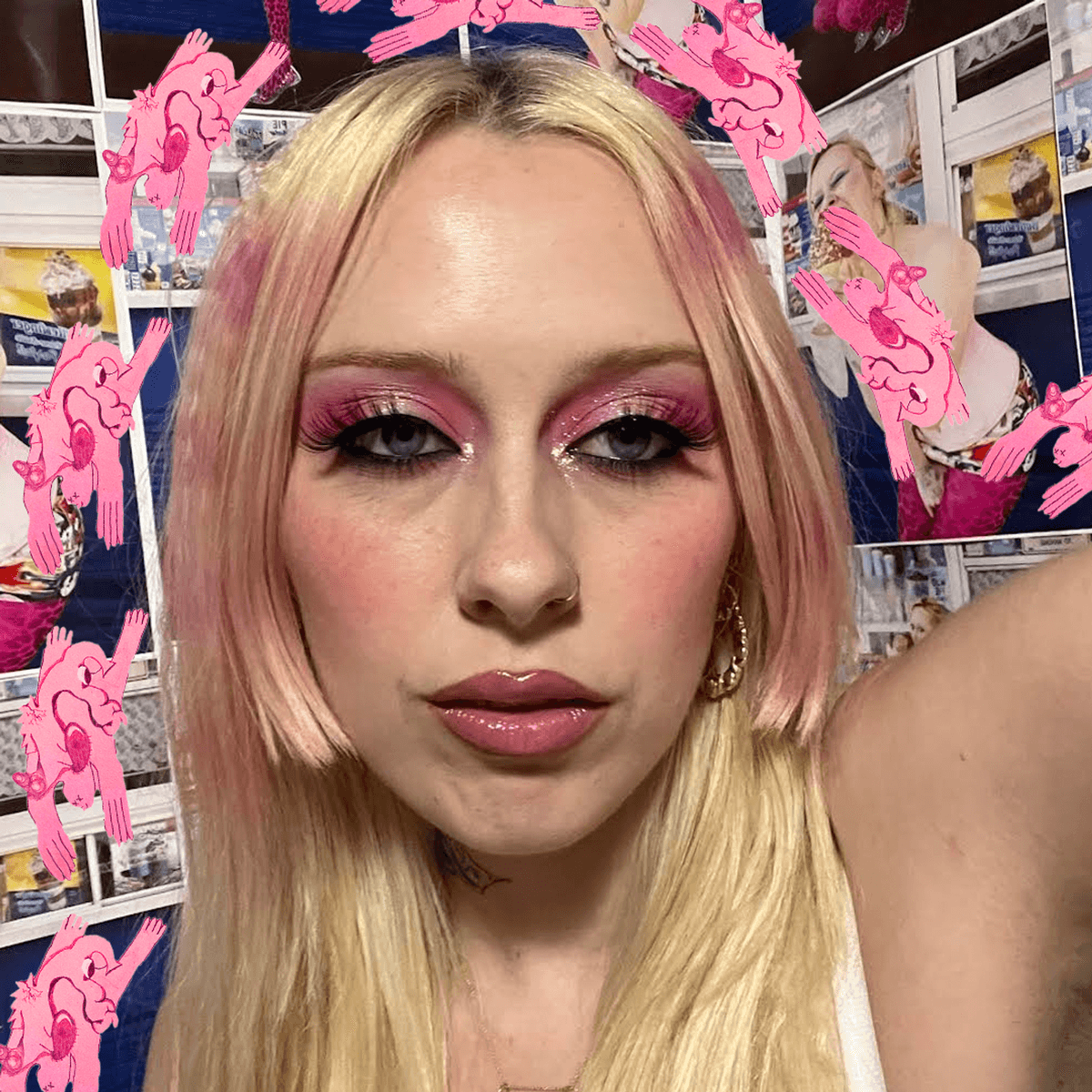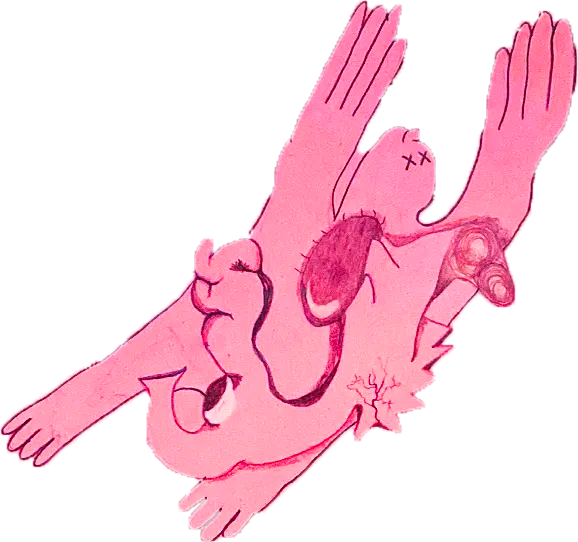DYSTOPIA GIRL
Harmony Tividad

There’s healing in [theater,] in over-performing and exaggerating femininity. In playing with it, I didn’t have to feel victimized by it anymore. The theatrics of play…have been really healing for me.
TESS POLLOK: You were a part of Girlpool for many years and now your first album as a solo artist, Dystopia Girl, is being released on Bandcamp. You’ve mentioned vulnerability, theater, and performance as unifying themes. How would you describe this album to people who haven’t heard your music before?
HARMONY TIVIDAD: It’s poppy but really lyrically-driven, concept-driven. It has pop vibes but it isn’t straightforward or simple in terms of its content.
POLLOK: What made you interested in making pop music?
TIVIDAD: It’s just something I’ve wanted to do for a really long time. I started working in Ableton when I was in Philly in 2016 just to explore a more industrial pop vibe. But I’d never produced before and I wasn’t that good at it–pop production is something you have to learn and hone over time. I was trying to do it myself but it felt out of reach. While I was still in Girlpool, I was making interesting and weird pop music as a side project, but the production was kind of fraught and it felt like it wasn’t clear to people because it was just so crazily done that it didn’t make sense. So Dystopia Girl is actually an idea I’ve been ruminating on for a long time because I’ve known for years that I wanted to make something poppy that was also lyrical and philosophical and emotional, something to bridge all this stuff that I enjoyed a lot. I didn’t even know that you could do sessions with producers, so once I understood that concept I started doing that more and realizing I could make this kind of music if I was working with someone else. Once that started happening, I was able to fully realize the concept and make it real. It’s been validating and amazing and healing because this is something I’ve wanted to explore for so long.
POLLOK: Was it intimidating to go solo after making music in a band for such a long time?
TIVIDAD: It was a little intimidating. [Avery Tucker] and I had been in Girlpool a long time and we were both wanting to make different things. On a practical level, we realized it wasn’t productive for us to be filtering everything through one another anymore. But it was never a negative thing, we just knew it was what we wanted to do.
POLLOK: That makes sense. Two peoples’ artistic trajectories aren’t going to be in perfect alignment for their entire lives. I wanted to talk a bit more with you about the themes, specifically theater. Were you a theater kid in high school?
TIVIDAD: I was obsessed with theater from elementary school through early high school. In high school I wasn’t getting cast in any of the musicals and that made me depressed and discouraged me from pursuing theater more. I started getting into punk music, indie music, DIY music as a way of finding another vessel to create through. But as I’ve aged, I’ve reconnected with my theater roots more.
POLLOK: That resonates with me as an artist. It’s always a journey back to the beginning and rediscovering what you already knew that you liked.
TIVIDAD: Literally. Everything I liked in childhood has resurfaced for me. If I ever denied liking something, that was out of pain. This is who I am now and I feel more clarity recognizing those patterns.
POLLOK: Are there any other things you remember from childhood that are influential to your music now?
TIVIDAD: I loved pop music as a kid but I rejected it as I became a teenager. I felt rejected and like I was an outsider–I had a lot of ideas about what I was and what I wasn’t so I shut myself out of a lot of things, again, because I felt like a reject. The older I get the more I realize I love pop music. It’s such an interesting way to connect people. I remember I used to love Disneyland and I’ve felt a resurgence in my interest in researching that and other deep Hollywood lore. I rejected LA, too, but now I love it. I don’t know, there was a lot of wounded behavior.
Everything I liked in childhood has resurfaced for me. If I ever denied liking something, that was out of pain. This is who I am now and I feel more clarity recognizing those patterns.
POLLOK: Why did you call it Dystopia Girl? What do you find invigorating about living in a dystopia? Or utopia?
TIVIDAD: Dystopia is everywhere. We live in a disturbing society that’s getting more disturbing every day. We’re also internally disturbed by it because of how bad the media is for our brains. It feels like we’re mirroring the industrial world we live in and it’s impossible to escape. The song “Dystopia Girl” is specifically about that–body image, self-perception, and sex. I wanted to explore how your perception of yourself is cyclically linked to societal images and how escaping it feels difficult.
POLLOK: How does social media affect these issues? Do you think we’ll still have it in a true utopia?
TIVIDAD: I don’t think social media is one thing. It really depends on where you are as a person. There are times when I feel free and liberated in the ability to express things to a sea of people and there are times where I feel complicated and confused and victimized by that ability.
POLLOK: Some other themes that you engage with on the album are the performance of gender and femininity. I was wondering if you wanted to elaborate at all on your perspectives about gender that are a part of the work?
TIVIDAD: I was recently diagnosed with PCOS and that’s been complicated. My body wasn’t creating enough estrogen so I had to go on bioidentical hormones, and my androgens, which are kind of a masculinizing hormone, were also really high. I felt really out of whack and complicated in my body for a really long time, really asexual and undesirable. My skin got really bad. I had horrible anxiety. I just was not well. But I’ve felt complicated in my femininity even before PCOS. Growing up in LA and being able to observe how other women absorb and process their femininity has been complicated for me. I was talking to my boyfriend the other day about going to a movie set when I was younger and seeing these beautiful blonde women with big boobs who were famous actresses and feeling scared of being simple in that way. Their femininity threatened me into thinking I was going to be reduced into a bimbo. I grew up with big boobs, blonde hair, and blue eyes and those genetics just felt threatening to me–it feels so silly now, but I remember talking to my friends all the time about how I never wanted to be that. I started to realize there could be healing in over-performing and exaggerating femininity. In playing with it I didn’t have to feel victimized by it anymore. The theatrics and play of femininity have been really healing for me.
POLLOK: That’s amazing to hear. You’ve mentioned theater and music as two big outlets for you, are there any other ways you like to express yourself creatively?
TIVIDAD: I journal constantly and write a lot of poems. I’ve written screenplays just for funsies. I really like writing anything, including short stories. But I’ve been too deep in music-making to do any writing right now, down the line I’ll probably want to write more.
POLLOK: How is music different for you than other forms of art that you make?
TIVIDAD: Music feels right to me, it feels like math. You have a little space to make a melody and words. It gels in a way that massages my brain. It feels tangible when it clicks, but other forms of art feel more fluid to me–but I think for other people, they feel the click in other forms of work more, it depends on the person. For example, I’ve done a lot of editing for my videos and I’ll have little moments where I’ll be, like, “Oh, this works.”
POLLOK: In terms of you editing your own videos, are there any videos or music video directors you admire?
TIVIDAD: I think Troye Sivan’s videos are great. The entire artistic campaign for his most recent rollout has been so inspiring. The one for “Got Me Started” had incredible colors and the way it was shot was so inspiring to me. It reminded me of Wong Kar-wai, who I’m obsessed with.
POLLOK: What other aesthetics influenced the look of Dystopia Girl? I’m also thinking of the “Shoplifting from Nike” music video.
TIVIDAD: I’m really enamored with video games, cartoons, and anime of all kinds. I wanted that video to feel a little bit removed from reality and fantastical and cartoonish. “Good Things Take Time” was inspired by Legally Blonde and a lot of other ‘90s movies, early ‘00s movies. Early rom-com culture is really inspiring to me.
POLLOK: What’s the best rom-com from that era?
TIVIDAD: I love Notting Hill. Love Actually is one of my all-time favorites, although technically that’s a Christmas movie. Anything with Hugh Grant. I love Hugh Grant, I would die for him.
POLLOK: You’ve also talked about how the general atmosphere of the album is optimistic. When I listen to the music, it feels really energized and hopeful to me. Is that what you were hoping to communicate?
TIVIDAD: Totally. I’ve gone through a lot of lows, some of them really low, in terms of my journey with my health, both physical and mental. At this point in my life I’m more interested in figuring out how to get on the other side of those things instead of sitting in them. The music is mirroring that desire to not sit in those feelings forever. I’m more connected to my joy than I have been in a really long time.
POLLOK: Dystopia Girl is a joyful album that also deals with overcoming pain. You’ve also talked in the past about how pain, again, relating to both your physical health and mental health, has really shaped your journey as an artist. Are there any touch points in how you think about pain and trauma relating to your life and work?
TIVIDAD: I’ve read a lot of new age self-help books. Pema Chödrön has been really helpful to me and her books about Shambhala. Esther Hicks has also written some books where she’s channeling a guy named Abraham and it’s interesting material, whatever it is she’s experiencing there is extremely intriguing to me and beautiful. When Things Fall Apart, again by Pema Chödrön. None of this is really about trauma, it’s just about how we experience pain in our lives and how we overcome that in a way that feels meaningful and healing. That’s all you can really do. Process things at face value, act honestly, do your best to look at things in the time that you have to look at them, and don’t judge yourself for doing what you need to do.
Harmony is a singer-songwriter from Los Angeles best known for her evocative lyricism and as one half of the lo-fi indie outfit Girlpool. In 2022, she struck out her own with her first solo EP, Dystopia Girl.
Tess Pollok is a writer. She is the editor-in-chief of Animal Blood.
← back to features
